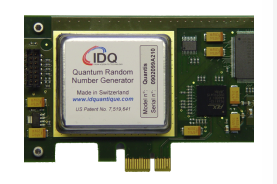I recently championed quantum key distribution networks and received a proper spanking from the answers and comments. This has led me to also question quantum random number generators. It appears that randomness is randomness, even if made by custom quantum hardware featuring lasers and photon genies.
It would seem that there is a great deal of chaff and hype surrounding quantum generation of anything at all, and so I'm left wondering what is the qualitative difference between:-
which is a 4 Mbps quantum beam splittersplitter[*] selling for ~€1300 and
when coupled with a simple Vonn Neumanvon Neuman[+] extraction technique? Consecutive throws from a dice shaker do not exhibit any auto correlation. This makes dice data eminently suitable for debiasing to make the resulting bits totally fair.
This is not a facile question. I'm interested in any tangible substantive difference between the two sequences of random bits other than speed. Are they just as random if not as fast? And therefore are quantum RNGs further examples of electronic snake oil?
It's easy to immediately berate such quantum hardware as pure marketing. No one's as cynical as I am, but the evidence suggests that there are non stupidgullible people (indeed commentators, universities and IT organisations) buying these. £M's are globally spent on researching new /faster quantum generators. NIST has one. Why should they bother demonstrating measurements outside of the cone of influencedemonstrating measurements outside of the cone of influence when they could use a smart card or dice? Are all of the people being fooled all of the time? That's meant to be impossible.
[*] A laser beam is split with a semi-mirror and detection of photons in the two resulting beams produces random bits. There is a white paper here describing this kit.
[+] This experiment produces independent and identically distributed random bits (not 1 - 6) due to the shaker cup eliminating correlations between throws, and the von Neumann extractor removing die bias. 1 truly random bit is generated every two throws (slightly less on average).


